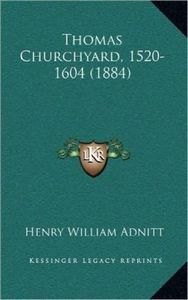Facsimile Reprint of 1884 edition
Thomas Churchyard (c. 1520 – 1604), English author, was born at Shrewsbury, the son of a farmer.
In 1541 he began his career as a soldier of fortune, being, he said, "pressed into the service." He fought his way through nearly every campaign in Scotland and the Low Countries for thirty years. He served under the emperor Charles V in Flanders in 1542, returning to England after the Peace of Crépy (1544).
In the Scottish campaign of 1547 he was present at the barren victory of Pinkie, and in the next year was taken prisoner at Saint Monance, but aided by his persuasive tongue he escaped to the English garrison at Lauder, where he was once more besieged, only returning to England on the conclusion of peace in 1550.
he departed once more to the wars to the Siege of Metz (1552), and "trailed a pike" in the emperor's army, until he joined the forces under William Grey, 13th Baron Grey de Wilton, with whom he says he served eight years. Grey was in charge of the fortress of Guînes, which was besieged by the duke of Guise in 1558.
Churchyard arranged the terms of surrender, and was sent with his chief to Paris as a prisoner. He was not released at the Peace of Cateau Cambrésis for lack of money to pay his ransom, but he was finally set free on giving his bond for the amount, an engagement which he repudiated as soon as he was safely in England.
He returned to active service under Lord Grey, who was in command of an English army sent in 1560 to help the Scottish rebels at the Siege of Leith, and in 1564 he served in Ireland under Sir Henry Sidney. The religious disturbances in the Netherlands attracted him to Antwerp, where, as the agent of William of Orange, he allowed the insurgents to place him at their head, and was able to save much property from destruction. This action made him so hated by the mob that he had to fly for his life in the disguise of a priest. In the next year he was sent by the earl of Oxford to serve definitely under the prince of Orange. After a year's service he obtained leave to return to England, and after many adventures and narrow escapes in a journey through hostile territory he embarked for Guernsey, and thence for England. His patron, Lord Oxford, disowned him, and the poet, whose health was failing, retired to Bath.
"THOMAS CHURCHYARD, a poet of the age of Elizabeth, one of those unfortunate men who have written poetry all their days, and lived a long life to complete the misfortune. His muse was so fertile, that his works pass all enumeration. He courted numerous patrons, who valued the poetry, while they left the poet to his own miserable contemplations." Issac Disreali
